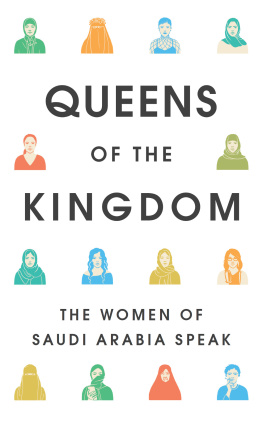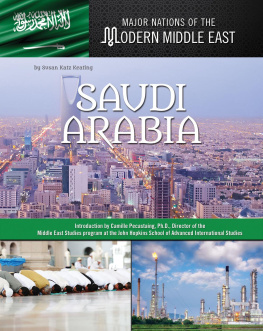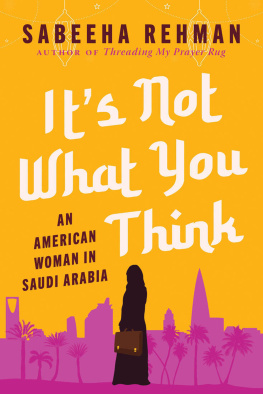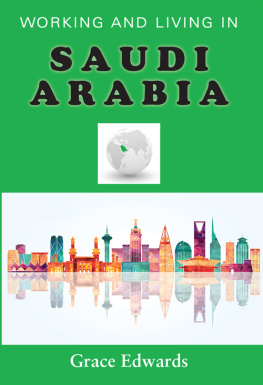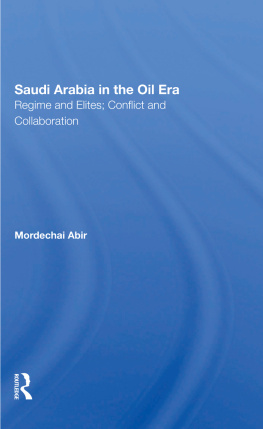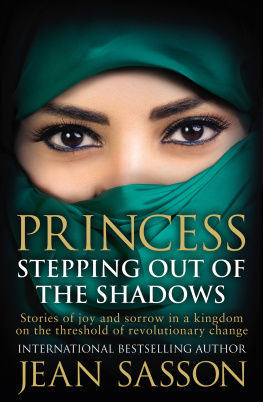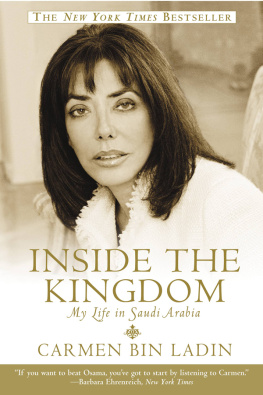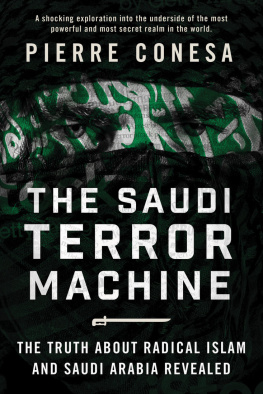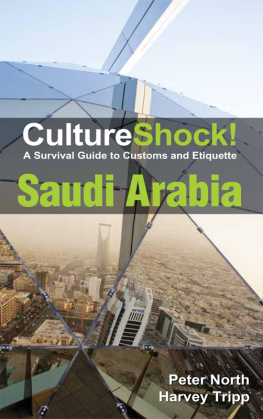GLOSSARY
abaya | Womens long, loose-fitting cloak worn in public or in the company of non-related males; usually black |
alhamduLillah | Thanks/Praise be to God |
baba | Dad |
Bedouin | desert dwellers; nomadic, Arabic peoples primarily inhabiting North Africa and the Arabian Peninsula |
hadith | Recorded sayings and deeds of the Prophet Mohammed |
haia | committee; colloquial name given to representatives of the Committee for the Promotion of Virtue and Prevention of Vice, externally referred to as the religious police |
haram | forbidden , according to Sharia; opposite of halal |
hijab | Modest code of dress that applies to both men and women; often used colloquially to refer to a womans headscarf |
imam | Islamic leader in worship and community life |
inshaAllah | God willing |
khalas | Exclamation equivalent to thats it! / enough! |
khula | Divorce initiated by a woman, dependent on the surrender of her bridal dower |
mahram | Any man a woman is prohibited from marrying due to kinship, e.g. her father, brothers, uncles, nephews |
Majlisal Shura | The highest consultative assembly in Saudi Arabias theocratic monarchy, charged with proposing legislation to the King; also known as the Shura Council |
mashaAllah | God has willed it; frequently used in a context of gratitude, celebration or praise |
muttawah | volunteer; deeply religious and pious individual(s) who practices Sharia according to its most literal interpretation and encourages others to do the same; colloquially used to refer to members of the Unit for the Promotion of Virtue and Prevention of Vice, externally referred to as the religious police |
niqab | Womens face veil, revealing only the eyes; usually black. |
Qabili | Families that claim to be able to trace their lineage back to one of two original tribes on the peninsula |
Quran | The holy book of Islam, believed to be the original, unaltered words of Allah, as revealed to his prophet, Mohammed |
Ramadan | The ninth month of the Islamic calendar, during which all Muslims of sound health participate in sunrise to sunset fasting from both food and water |
riyal | Saudi currency |
Salafism | Movement within Islam which advocates a return to the traditions and practices of the salaf : the first three generations of Muslims, including that of the Prophet Mohammed |
Sharia | Islamic system of life and law based on the Quran and Hadith . Sharia may never be altered, but is open to interpretation |
Shura Council | See Majlis al Shura |
shisha | Water pipes used for smoking flavoured tobacco |
Sunnah | Collected religious practices established by the Prophet Mohammed |
tarha | Womens headscarf; in Saudi Arabia usually worn together with the abaya |
thobe | Mens traditional long white tunic |
Vision 2030 | National development strategy which aims to diversify the economy away from oil-dependency and advance public, cultural and social sectors |
wAllah | I swear it by God |
Wahhabism | Highly conservative branch of Islam based on literal interpretation of the Quran and Hadith; aims to purify the faith of modern distortions |
wasta | Social and professional influence accrued through name, connections and the lending of favours |
yanee | it means; a common filler in conversation, i.e. you know? |
AN INTRODUCTION
One day in my mid-twenties, my father sat me down for a talk about my future. By this time I had worked as a teacher, a translator, a logistics coordinator and a research assistant and had lived in several countries. Nonetheless, my father was concerned for my professional and financial stability it was time, he said, to settle on more gainful, long-term employment.
I took his words to heart. Three months later, on my next visit, I proudly informed him that I had been offered a permanent contract with a healthy salary and the opportunity to contribute to two of the fields that most inspired me: womens empowerment and transformative education. I had accepted a role at the first university for women in Saudi Arabia. And with those two little words, his delighted smile froze.
My parents concerns were understandable. We can only make judgements based on the information available to us, and Saudi Arabia had become the pantomime villain of the international media, rivalled only perhaps by North Korea.
It was a negative narrative cemented by its repetition. Every news article I read on the country seemed to follow the same copy-and-paste formula. The first paragraph outlined the headline issue, the second regardless of the articles topic offered commentary on the female driving ban, and the third helpfully informed the reader of any executions ordered by the state during the preceding months.
Sensationalist coverage of the region has been legitimised by the difficulties encountered by reporters in entering Saudi Arabia, combined with the lack of media output released by the country itself. Ironically, perhaps, it is the Kingdoms attempt to lay low, reinforced by the deep value attributed to privacy in Saudi society, which has made the country such an object of fascination; an interest that revolves primarily around the lives of its female citizens.
But, despite being the focus of so many column inches, the women around whom such articles centred were invariably reduced to two-dimensional stock images of black-veiled figures. The only female voices regularly emerging seemed to be those of state-sanctioned spokeswomen or frustrated activists and those who had escaped especially abusive circumstances.
My own interest was piqued, not by what we were told of the lives of women in Saudi Arabia, but by what we werent. I have always believed that life is formed far more by shades of grey than the utopian or dystopian narratives that may be comfortably contained by the black-and-white print of the news column.
I also felt that, while I claimed to be a feminist and an ally of women in their struggles worldwide, my own experience of womanhood had, until this point, been very narrow and very sheltered. Who was I to judge another womans way of life when I had never walked a mile in her shoes, or indeed, her veil?
So I packed a single case, purchased a black abaya and niqab , the body-concealing cloak and face veil habitually worn by Saudi women in public, on eBay (both of my choices I was later to learn were shamefully unfashionable) and collected my ticket to Riyadh.

